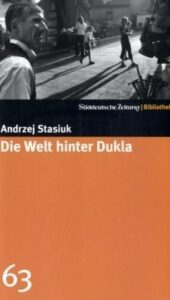Without the Süddeutsche Zeitung’s set of 50 more great novels of the 20th century, it might have been a very long time before I heard of Andrzej Stasiuk, let alone read any of his books. Stasiuk was born in Warsaw in 1960, but he makes his home in a small town in Poland’s furthest southern reaches. He did not fit in well in communist-era Poland: he was dismissed from secondary school, dropped out of vocational school, and spent more than a year in jail for deserting the army. His literary career did not begin until after the old system collapsed. He has published nearly two dozen books, a number of which have been translated into English.
Die Welt hinter Dukla — the German title translates as The World Behind Dukla although the book’s title in both its Polish original and its English translation is simply Dukla — is apparently typical of Stasiuk’s work in that it is long on impressions, short on plot, and somewhere in the middle on character, with most of the characterizations emerging from the impressions. Dukla itself is a real town in southeastern Poland, population about 2,000, about 20km north of the border with Slovakia, about 60km west of the border Ukraine. I don’t doubt that it’s physically very much as Stasiuk describes, though the narrator’s impressions, recollections and evaluations are obviously the matter of Stasiuk’s art.
The narrator is consciously telling a story, or rather a series of anecdotes, but he says several times that there is no overarching plot, and it’s nearly true. He relates numerous visits he has made to Dukla over the course of his life, from summer stays as a boy and adolescent up through the book’s present day of 1997, when Pope John Paul II comes to town for a day to pay tribute to St. John of Dukla, one of the patron saints of Poland and Lithuania. Through the narrator’s tales, readers put together a picture of small-town life in Poland from the 1970s through the 1990s, and a consistent absence of great events. They also hear parts of a non-conformist growing up and coming of age. If the narrator has ambitions, he doesn’t reveal them in the book. He doesn’t mention any work in his adult life either, though he and his friends always have a car and enough funds to cover trips to Dukla and the surrounding areas.
He describes the papal visit in similarly nonchalant terms, mostly as a matter of gathering large numbers of people and what the people outside the crowd-control barriers see and do, how difficult it is to find a bathroom during the long wait. I’m not sure that the narrator ever uses the word “Pope,” though eventually it becomes clear who is causing so much commotion in the town. Polish readers would presumably have been more familiar with the event, particular those who read the book closer to its original publication in the same year as the visit. That was the year I took a two-week solo bicycle ride across north central Poland, so I remember the era well, and Stasiuk captures it nicely. Dukla is more of a backwater than the places I visited, but many of those still qualified as sleepy. The streets and squares Stasiuk describes rang true, as did the continued precarious balance of state socialism receding into the past almost a decade after the revolution, but prosperity still a rumor in many places. It would be another seven years before Poland joined the European Union, and more years before regional aid and tighter integration showed widespread results.
In the meantime, life went on in places like Dukla. The narrator recalls playing and swimming during his childhood, discovering the mysterious allures of girls as an adolescent, learning family history indirectly when he asks why people crossed the river to get baptized. About one-third of the way through the book Stasiuk is writing about Dukla in the years around 1910, when the town had a population of about 3,000, two-thirds of whom were Jewish.
Everything together reminds one of a sepia-tone photograph, or of old celluloid — both of them go up in flames easily and leave behind an empty space. Entirely as if time had been burned up. If things that exist in space are destroyed an emptiness remains that we fill with other things. But how is it with time? Probably it grows back together like something organic and keeps on going, we’re used to continuity, which reminds a little bit of immortality. But what if the noble Mniszech family, the Jews and the horse-drawn coaches had left behind empty spaces, hollow spaces, like the burned holes cigars make in one’s good suit? (p. 55)
During the Second World War, the area around Dukla would have seen not only fighting between Nazi Germany and the Soviet Union but also between Polish and Ukrainian partisans. After the war, most Ukrainians were driven from the region by more fighting, as Poles were expelled from places further east. Post-war Dukla was a different place, inhabited by a new population. Stasiuk’s narrator would have heard some of those echoes, noticing the silences and gaps as he grew older and more aware of the world. Most of the stories are more personal, about this girl or that train trip or those hills over there, but the history is part of the sense of place that Stasiuk communicates.
I wouldn’t want to read only books like Dukla, but I am glad that the editors of the Süddeutsche series pointed the way so that I, too, could pay a visit to the world behind Dukla.


1 ping
[…] at Eboli 62. Brigitte Kronauer: Berittener Bogenschütze (Mounted Archer) 63. Andrzej Stasiuk: Die Welt hinter Dukla (Dukla — the title of the Polish original is also just Dukla) 64. Kurt Tucholsky: Schloss […]